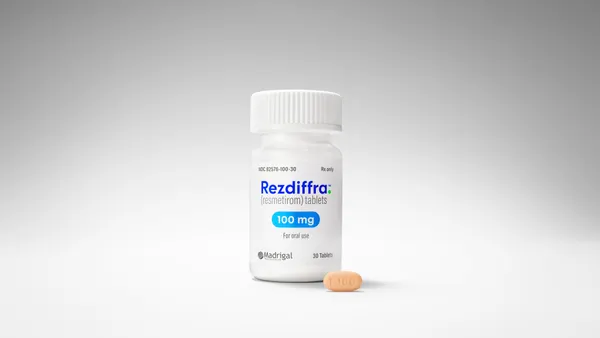The copycats are ready to pounce in 2023. With seven biosimilars referencing AbbVie's mega-blockbuster autoimmune drug Humira set to launch in the U.S., the year could be a pivotal moment for biosimilar adoption down the road.
Pharma giant Amgen, a leader in biosimilars with four on the U.S. market already and a total of 11 in its portfolio, is seeking to ride that expansion and perhaps change the treatment landscape along the way, wrote Jen Norton, the company's vice president of U.S. value and access, in a recent trend report.
"This is only the beginning," Norton said. "We are embarking on an exciting wave of growth expected to transform the U.S. marketplace with biosimilars."
Biosimilars in the U.S.
Amgen is among the companies that have developed biosimilars for Humira, a process that's more similar to creating a new drug than it is to a generic, which can be done by knowing a chemical recipe. Biologics and biosimilars require living organisms to develop the active compounds, meaning they can't be 100% replicas the same way a generic is to a branded small molecule drug — but they do need to demonstrate that they perform in a similar way.
Next year, Amgen's Humira biosimilar Amjevita will be joined by Hadlima from Samsung Bioepis and Merck & Co., Cyltezo from Boehringer Ingelheim, Yusimry from Coherus BioSciences, Hulio from Viatris-Fuji, Hyrimoz from Sandoz and Abrilada from Pfizer. All of these Humira biosimilars are approved in the U.S. and will launch at different times throughout 2023.
For patients, the seven more options, which give Humira competition where it has never had it before, should theoretically drive down the price. In Europe, where Humira biosimilars launched already, AbbVie reported a more than 31% decrease in net revenue within a year and a half.
With 39 biosimilars approved and 22 launched in the U.S. as of this month, the healthcare system has seen an estimated $21 billion in savings over six years, according to an analysis by Amgen. Since the first U.S. biosimilar launched in 2015, more pharma companies have jumped into the pool to leverage their biologic development and manufacturing capabilities to become part of the growing trend.
For pharma companies, biosimilars can be a double-edged sword. The same companies fighting in court to have their biosimilars approved have found themselves on the other side of the aisle fighting to keep exclusivity for their own branded medicine. Amgen fought AbbVie in court to bring the Humira biosimilar to market, ending in a settlement for the 2023 launch. Just last year, though, Amgen successfully fended off a Novartis-made biosimilar of its drug Enbrel — that case brought by Novartis landed on the desk of the Supreme Court, where it was declined. Novartis itself makes both biologics and biosimilars. So do Pfizer and Biogen.
The FDA reached a peak of 10 approved biosimilars in 2019, adding two to three more each year to their total since the start of the program. The agency hasn't reached that number again since the start of the COVID-19 pandemic, but the numbers are beginning to recover with six approved so far this year. Launches tend to lag behind these approvals due to litigation.
But the number of companies participating in the FDA's Biosimilar Development Program continues to rise, Amgen reported. From 77 development programs in 2019, there were 96 programs as of March this year.
Amgen also noted that the U.S. regulator is moving faster than its European counterpart did when the program began there in 2006. Cumulatively in the first eight years after the EMA approved the first biosimilar, the EU had 15 approvals compared to the 39 in the U.S.
A new provision in President Biden's Inflation Reduction Act now incentivizes biosimilar competition by increasing the amount Medicare will pay healthcare providers to use the copycats instead of the branded biologic. And as biosimilars become more prevalent in the marketplace, Amgen said the U.S. is "poised to see further growth in the number of biosimilars approved” and that the company welcomes “many new biosimilars in the years to come."












